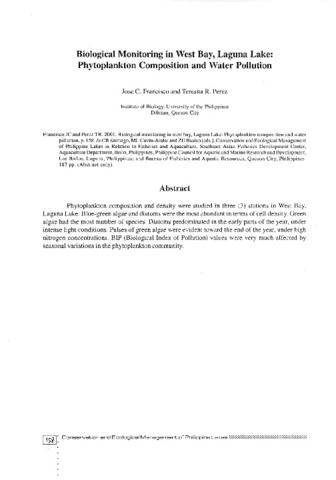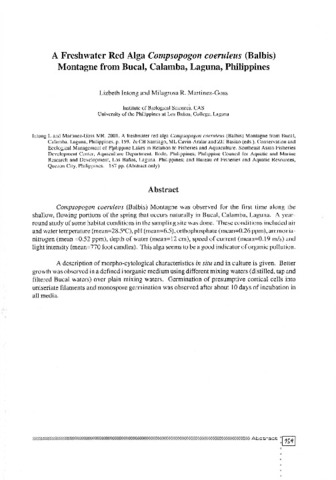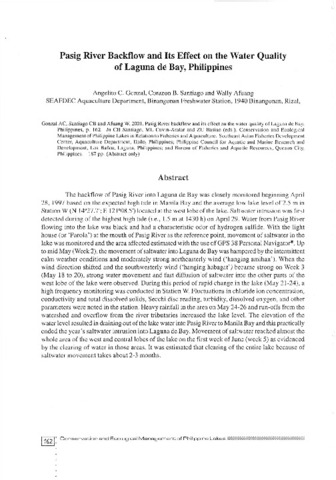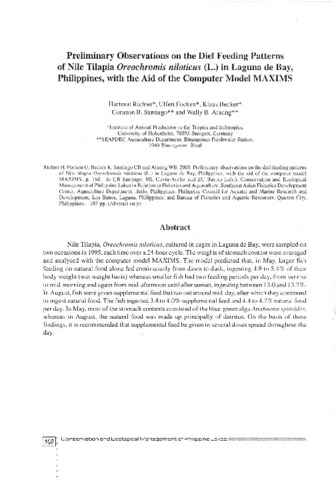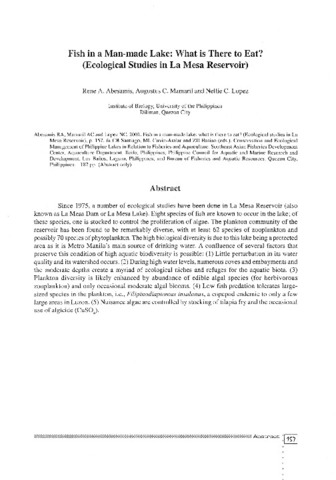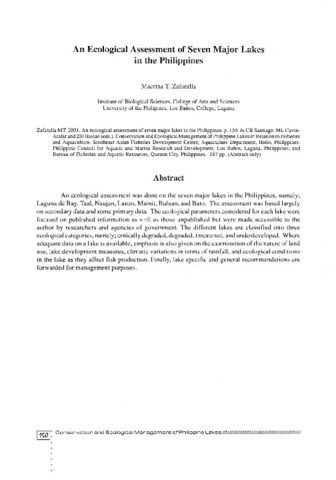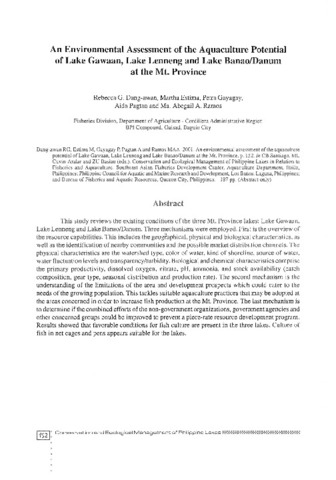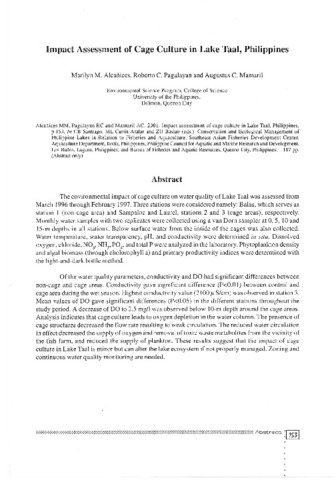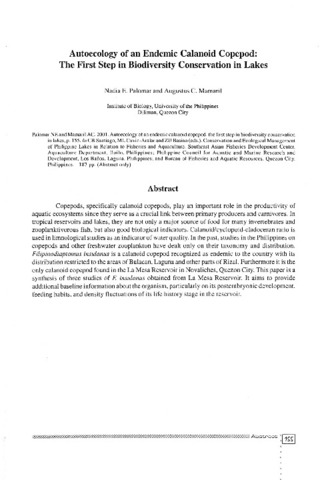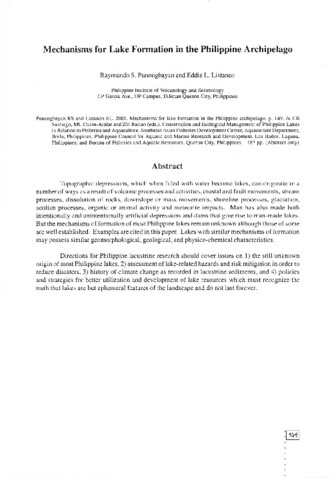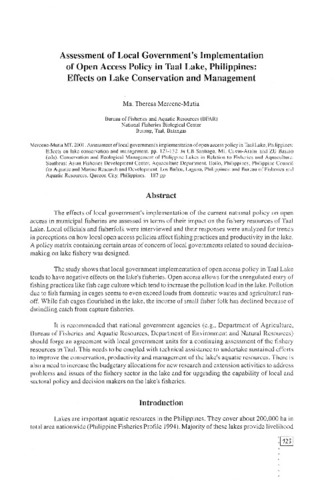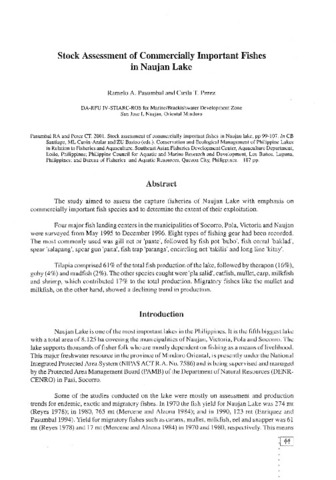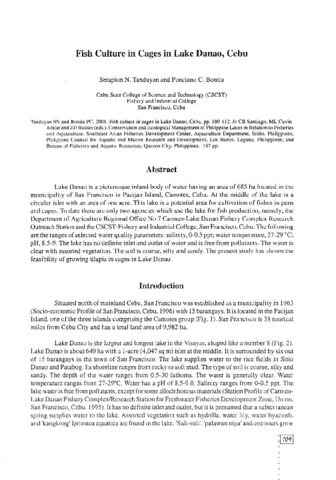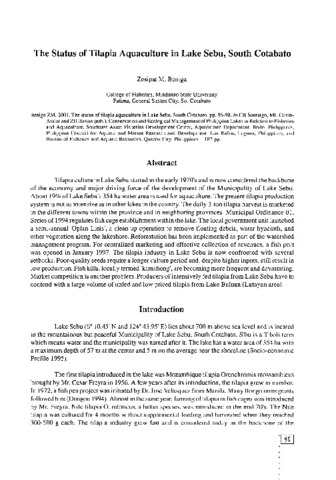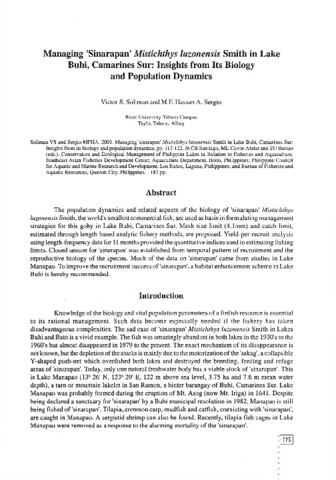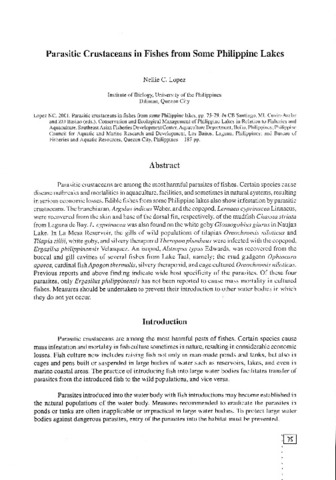Conservation and Ecological Management of Philippine Lakes in Relation to Fisheries and Aquaculture
Browse by
Conservation and Ecological Management of Philippine Lakes in Relation to Fisheries and Aquaculture : Proceedings of the National Seminar-Workshop held on October 21-23, 1997, INNOTECH, Commonwealth Ave., Diliman, Quezon City, Philippines
This volume documents the proceedings of the national seminar-workshop held October 21-23, 1997 in Quezon City which was co-organized by SEAFDEC/AQD, PCAMRD and DA-BFAR. The proceedings contains three plenary papers: (1) SEAFDEC contribution to the ecological awareness of Philippine lakes, (2) sustainable development of lake resources and the R&D agenda, and (3) aquaculture practices and their impact on lakes. Eleven technical papers discussed Lake Mahagnao in Leyte, Laguna de Bay, Lake Sebu in South Cotabato, Naujan Lake in Mindoro, Lake Danao in Cebu, Lake Buhi in Camarines Sur, Taal Lake in Taal. Abstracts of 13 other papers and posters are included in the volume. Two annexes follow: listing of lakes in the country and their common problems, recommended strategies, and action plans.Recent Submissions
-
Biological monitoring in west bay, Laguna Lake: Phytoplankton composition and water pollution
(Aquaculture Department, Southeast Asian Fisheries Development Center; Philippine Council for Aquatic and Marine Research and Development (PCAMRD), Department of Science and Technology; Bureau of Fisheries and Aquatic Resources, 2001)Phytoplankton composition and density were studied in three (3) stations in West Bay, Laguna Lake. Blue-green algae and diatoms were the most abundant in terms of cell density. Green algae had the most number of species. ... -
A freshwater red alga Compsopogon coeruleus (Balbis) Montagne from Bucal, Calamba, Laguna, Philippines
(Aquaculture Department, Southeast Asian Fisheries Development Center; Philippine Council for Aquatic and Marine Research and Development (PCAMRD), Department of Science and Technology; Bureau of Fisheries and Aquatic Resources, 2001)Compsopogon coeruleus (Balbis) Montagne was observed for the first time along the shallow, flowing portions of the spring that occurs naturally in Bucal, Calamba, Laguna. A year-round study of some habitat conditions in ... -
Pasig River backflow and its effect on the water quality of Laguna de Bay, Philippines
(Aquaculture Department, Southeast Asian Fisheries Development Center; Philippine Council for Aquatic and Marine Research and Development (PCAMRD), Department of Science and Technology; Bureau of Fisheries and Aquatic Resources, 2001)The backflow of Pasig River into Laguna de Bay was closely monitored beginning April 28, 1997 based on the expected high tide in Manila Bay and the average low lake level of 2.5 m in Station W (N 14°27.7'; E 121°08.5') ... -
Species and proximate composition of Laguna de Bay phytoplankton cultured in three different nitrogen-phosphorus ratios and their utilization by Nile tilapia
(Aquaculture Department, Southeast Asian Fisheries Development Center; Philippine Council for Aquatic and Marine Research and Development (PCAMRD), Department of Science and Technology; Bureau of Fisheries and Aquatic Resources, 2001)Natural phytoplankton populations from Laguna de Bay were used in outdoor batch culture experiment in 1-ton capacity circular concrete tanks and 60-liter glass aquaria for a maximum duration of 72 days. The treatments ... -
Preliminary observations on the diel feeding patterns of Nile tilapia Oreochromis niloticus (L.) in Laguna de Bay, Philippines, with the aid of the computer model MAXIMS
(Aquaculture Department, Southeast Asian Fisheries Development Center; Philippine Council for Aquatic and Marine Research and Development (PCAMRD), Department of Science and Technology; Bureau of Fisheries and Aquatic Resources, 2001)Nile Tilapia, Oreochromis niloticus, cultured in cages in Laguna de Bay, were sampled on two occasions in 1995, each time over a 24-hour cycle. The weights of stomach content were averaged and analysed with the computer ... -
Fish in a man-made lake: what is there to eat? (Ecological studies in La Mesa Reservoir)
(Aquaculture Department, Southeast Asian Fisheries Development Center; Philippine Council for Aquatic and Marine Research and Development (PCAMRD), Department of Science and Technology; Bureau of Fisheries and Aquatic Resources, 2001)Since 1975, a number of ecological studies have been done in La Mesa Reservoir (also known as La Mesa Dam or La Mesa Lake). Eight species of fish are known to occur in the lake; of these species, one is stocked to control ... -
An ecological assessment of seven major lakes in the Philippines
(Aquaculture Department, Southeast Asian Fisheries Development Center; Philippine Council for Aquatic and Marine Research and Development (PCAMRD), Department of Science and Technology; Bureau of Fisheries and Aquatic Resources, 2001)An ecological assessment was done on the seven major lakes in the Philippines, namely; Laguna de Bay, Taal, Naujan, Lanao, Mainit, Buluan, and Bato. The assessment was based largely on secondary data and some primary data. ... -
An environmental assessment of the aquaculture potential of Lake Gawaan, Lake Lenneng and Lake Banao/Danum at the Mt. Province
(Aquaculture Department, Southeast Asian Fisheries Development Center; Philippine Council for Aquatic and Marine Research and Development (PCAMRD), Department of Science and Technology; Bureau of Fisheries and Aquatic Resources, 2001)This study reviews the existing conditions of the three Mt. Province lakes: Lake Gawaan, Lake Lenneng and Lake Banao/Danum. Three mechanisms were employed. First is the overview of the resource capabilities. This includes ... -
The decline of native fishes and fisheries and the rise of aquaculture in lakes and rivers in the Philippines
(Aquaculture Department, Southeast Asian Fisheries Development Center; Philippine Council for Aquatic and Marine Research and Development (PCAMRD), Department of Science and Technology; Bureau of Fisheries and Aquatic Resources, 2001)This paper reviews historical and recent data on biodiversity, fisheries, exotic fishes, and aquaculture in Philippine lakes and rivers. The country's lakes and rivers are poor in primary freshwater fishes because the ... -
Impact assessment of cage culture in Lake Taal, Philippines
(Aquaculture Department, Southeast Asian Fisheries Development Center; Philippine Council for Aquatic and Marine Research and Development (PCAMRD), Department of Science and Technology; Bureau of Fisheries and Aquatic Resources, 2001)The environmental impact of cage culture on water quality of Lake Taal was assessed from March 1996 through February 1997. Three stations were considered namely: Balas, which serves as station 1 (non-cage area) and Sampaloc ... -
Autoecology of an endemic calanoid copepod: The first step in biodiversity conservation in Lakes
(Aquaculture Department, Southeast Asian Fisheries Development Center; Philippine Council for Aquatic and Marine Research and Development (PCAMRD), Department of Science and Technology; Bureau of Fisheries and Aquatic Resources, 2001)Copepods, specifically calanoid copepods, play an important role in the productivity of aquatic ecosystems since they serve as a crucial link between primary producers and carnivores. In tropical reservoirs and lakes, they ... -
Some limnological features of the northern shore areas of Volcano Island, Lake Taal
(Aquaculture Department, Southeast Asian Fisheries Development Center; Philippine Council for Aquatic and Marine Research and Development (PCAMRD), Department of Science and Technology; Bureau of Fisheries and Aquatic Resources, 2001)Physico-chemical and biological features of the northern shore areas of Volcano Island, Lake Taal observed at monthly intervals from four stations during the period 1994 and 1996 indicate varied microhabitats inhabited by ... -
Mechanisms for lake formation in the Philippine archipelago
(Aquaculture Department, Southeast Asian Fisheries Development Center; Philippine Council for Aquatic and Marine Research and Development (PCAMRD), Department of Science and Technology; Bureau of Fisheries and Aquatic Resources, 2001)Topographic depressions, which when filled with water become lakes, can originate in a number of ways as a result of volcanic processes and activities, crustal and fault movements, stream processes, dissolution of rocks, ... -
Assessment of local government's implementation of open access policy in Taal Lake, Philippines: Effects on lake conservation and management
(Aquaculture Department, Southeast Asian Fisheries Development Center; Philippine Council for Aquatic and Marine Research and Development (PCAMRD), Department of Science and Technology; Bureau of Fisheries and Aquatic Resources, 2001)The effects of local government's implementation of the current national policy on open access in municipal fisheries are assessed in terms of their impact on the fishery resources of Taal Lake. Local officials and fisherfolk ... -
Stock assessment of commercially important fishes in Naujan Lake
(Aquaculture Department, Southeast Asian Fisheries Development Center; Philippine Council for Aquatic and Marine Research and Development (PCAMRD), Department of Science and Technology; Bureau of Fisheries and Aquatic Resources, 2001)The study aimed to assess the capture fisheries of Naujan Lake with emphasis on commercially important fish species and to determine the extent of their exploitation. Four major fish landing centers in the ... -
Fish culture in cages in Lake Danao, Cebu
(Aquaculture Department, Southeast Asian Fisheries Development Center; Philippine Council for Aquatic and Marine Research and Development (PCAMRD), Department of Science and Technology; Bureau of Fisheries and Aquatic Resources, 2001)Lake Danao is a picturesque inland body of water having an area of 685 ha located in the municipality of San Francisco in Pacijan Island, Camotes, Cebu. At the middle of the lake is a circular islet with an area of one ... -
Translocation of the clupeid Sardinella tawilis to another lake in the Philippines: A proposal and ecological considerations
(Aquaculture Department, Southeast Asian Fisheries Development Center; Philippine Council for Aquatic and Marine Research and Development (PCAMRD), Department of Science and Technology; Bureau of Fisheries and Aquatic Resources, 2001)The dwindling commercial catch of Sardinella tawilis (Clupeidae), locally known as 'tawilis', reported in recent years by local fisher folk in Lake Taal, Batangas, Philippines, could be a result of the interaction of factors ... -
The status of tilapia aquaculture in Lake Sebu, South Cotabato
(Aquaculture Department, Southeast Asian Fisheries Development Center; Philippine Council for Aquatic and Marine Research and Development (PCAMRD), Department of Science and Technology; Bureau of Fisheries and Aquatic Resources, 2001)Tilapia culture in Lake Sebu started in the early 1970's and is now considered the backbone of the economy and major driving force of the development of the Municipality of Lake Sebu. About 19% of Lake Sebu's 354 ha water ... -
Managing 'sinirapan' Mistichthys luzonensis Smith in Lake Buhi, Camarines Sur: Insights from its biology and population dynamics
(Aquaculture Department, Southeast Asian Fisheries Development Center; Philippine Council for Aquatic and Marine Research and Development (PCAMRD), Department of Science and Technology; Bureau of Fisheries and Aquatic Resources, 2001)The population dynamics and related aspects of the biology of 'sinarapan' Mistichthys luzonensis Smith, the world's smallest commercial fish, are used as basis in formulating management strategies for this goby in Lake ... -
Parasitic crustaceans in fishes from some Philippine Lakes
(Aquaculture Department, Southeast Asian Fisheries Development Center; Philippine Council for Aquatic and Marine Research and Development (PCAMRD), Department of Science and Technology; Bureau of Fisheries and Aquatic Resources, 2001)Parasitic crustaceans are among the most harmful parasites of fishes. Certain species cause disease outbreaks and mortalities in aquaculture, facilities, and sometimes in natural systems, resulting in serious economic ...

